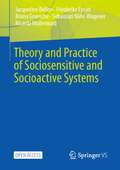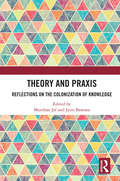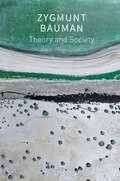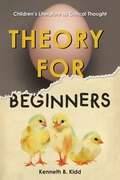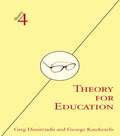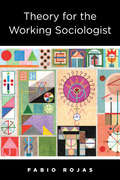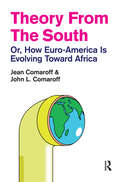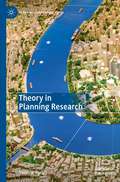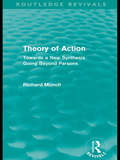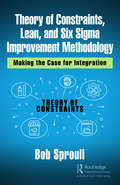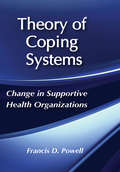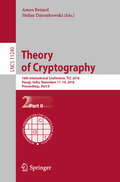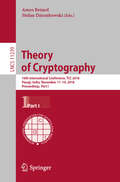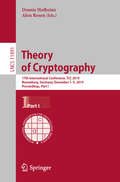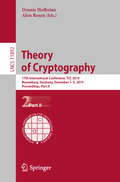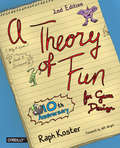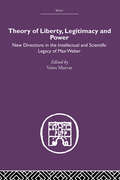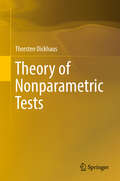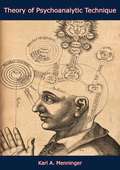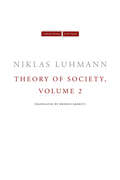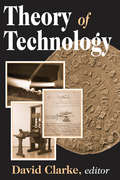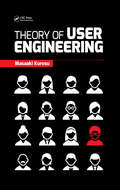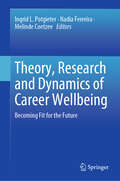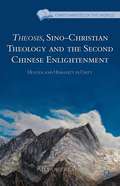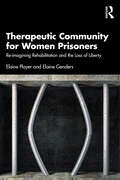- Table View
- List View
Theory and Practice of Sociosensitive and Socioactive Systems
by Friederike Eyssel Bruno Gransche Jacqueline Bellon Sebastian Nähr-Wagener Ricarda WullenkordInteractive adaptive systems increasingly become part of our everyday life. Which factors could shape this development and under which conditions will interactions with technical systems be deemed socially appropriate? The "FActors of Social Appropriateness" (FASA) Model presented in this Open Access-book provides a structured approach to our understanding of social appropriateness in human-technology interaction. The FASA Model serves to inform design choices for sociosensitive and socioactive artificial assistants.
Theory and Praxis: Reflections on the Colonization of Knowledge
by Potter Murzban Jal Jyoti BawaneThis book proposes a New Enlightenment – a new way of looking at the non-Western world. Breaking new ground, the essays chart a course beyond Eurocentric discourses (which completely ignore the contributions of Asia, Africa and Latin-America) and forms of nativism (which are usually ethnocentric discourses). The volume: Focuses on the historical aspects of knowledge-production and its colonization; Examines the genre of multilinear histories that displaces hegemonic Eurocentric discourses; Enlarges the scope of multilinear historicism whereby Asia, Europe, Africa and the Americas are drawn in a new humanistic knowledge system; Studies how colonization is resisted in both the non-Western and Western world. Lucid and engaging, this book will be of great interest to scholars and researchers of social theory, education, politics and public policy.
Theory and Society: Selected Writings, Volume 3
by Zygmunt BaumanThe breadth and depth of Zygmunt Bauman’s engagement with social theory and the history of social thought has perhaps been underestimated, in part because many of his early writings were in Polish and never translated into English, and in part because many important pieces appeared in edited volumes and journals that are not readily available. This volume brings together hitherto unknown or rare pieces by Bauman on the theme of theory and society and also makes available previously unpublished material from the Bauman Archive at the University of Leeds. A consistent theme of Bauman’s work was his sustained engagement with humanism, and this provides a unifying thread in the pieces brought together in this volume. Here Bauman reflects on some of the core concepts of sociology, examines the work of a wide range of social theorists, from Durkheim and Gramsci to Agnes Heller and C. Wright Mills, and addresses an array of key ideas and issues including inequality, identity and social change. A substantial introduction by the editors provides readers with a lucid guide through this material and develops connections to Bauman’s other works. This is the third and final volume in a series of books that make available the lesser-known writings of one of the most influential social thinkers of our time. It will be of interest to students and scholars across the arts, humanities and social sciences, and to a wider readership.
Theory for Beginners: Children’s Literature as Critical Thought
by Kenneth B. KiddSince its inception in the 1970s, the Philosophy for Children movement (P4C) has affirmed children’s literature as important philosophical work. Theory, meanwhile, has invested in children’s classics, especially Lewis Carroll’s Alice books, and has also developed a literature for beginners that resembles children’s literature in significant ways. Offering a novel take on this phenomenon, Theory for Beginners explores how philosophy and theory draw on children’s literature and have even come to resemble it in their strategies for cultivating the child and/or the beginner. Examining everything from the rise of French Theory in the United States to the crucial pedagogies offered in children’s picture books, from Alison Bechdel’s graphic memoir Are You My Mother? and Lemony Snicket’s A Series of Unfortunate Events to studies of queer childhood, Kenneth B. Kidd deftly reveals the way in which children may learn from philosophy and vice versa.
Theory for Education: Adapted from Theory for Religious Studies, by William E. Deal and Timothy K. Beal (theory4)
by George Kamberelis Greg DimitriadisTheory for Education provides a concise and clear introduction to key contemporary theorists, including their lives, major works and ideas. Written for the student in need of a quick introduction or for the scholar brushing up on details, this new volume in the theory4 series presents major thinkers whose work and ideas have shaped critical thinking in our time. Greg Dimitriadis and George Kamberelis underscore the particular relevance of these thinkers for the field of education - their work on education, how others in education have used them and possible future directions for teachers and researchers. Theory for Education's ease of use, clarity and comprehensive scope will be invaluable for those entering the field. Adapted from Theory for Religious Studies, by William E. Deal and Timothy K. Beal.
Theory for the Working Sociologist
by Fabio RojasTheory for the Working Sociologist makes social theory easy to understand by revealing sociology's hidden playbook. Fabio Rojas argues that sociologists use four different theoretical "moves" when they try to explain the social world: how groups defend their status, how people strategically pursue their goals, how values and institutions support each other, and how people create their social reality. Rojas uses famous sociological studies to illustrate these four types of theory and show how students and researchers may apply them to their interests. The guiding light of the book is the concept of the "social mechanism," which clearly and succinctly links causes and effects in social life.Drawing on dozens of empirical studies that define modern sociology and focusing on the nuts and bolts of social explanation, Rojas reveals how areas of study within the field of sociology that at first glance seem dissimilar are, in fact, linked by shared theoretical underpinnings. In doing so, he elucidates classical and contemporary theory, and connects both to essential sociological findings made throughout the history of the field. Aimed at undergraduate students, graduate students, journalists, and interested general readers who want a more formal way to understand social life, Theory for the Working Sociologist presents the underlying themes of sociological thought using contemporary research and plain language.
Theory from the South: Or, How Euro-America is Evolving Toward Africa (The Radical Imagination)
by John L. Comaroff Jean ComaroffAs nation-states in the Northern Hemisphere experience economic crisis, political corruption and racial tension, it seems as though they might be 'evolving' into the kind of societies normally associated with the 'Global South'. Anthropologists Jean and John Comaroff draw on their long experience of living in Africa to address a range of familiar themes - democracy, national borders, labour and capital and multiculturalism. They consider how we might understand these issues by using theory developed in the Global South. Challenging our ideas about 'developed' and 'developing' nations, Theory from the South provides new insights into key problems of our time.
Theory in Planning Research (Planning, Environment, Cities)
by Yvonne RydinDoing research is an essential element of almost all programmes in planning studies as well as related areas such as geography and urban studies, from undergraduate, through Masters to doctoral programmes. While most texts on such research emphasise methodologies, this book is unique in addressing how theoretical frameworks and perspectives can inform research activity. Providing both a concise introduction to a wide range of such theories and detailed engagement with cases of planning research, it provides the reader with the insights necessary to conduct theory-informed research. It offers an understanding of how the choice of a theoretical framework has implications for the focus of the research, the precise research questions addressed and the methodologies that will be most effective in answering those questions. Through practical advice and published examples it will support planning researchers in doing stronger, more widely-applicable research, which answers key questions about planning systems and their role within our societies.
Theory of Action (Routledge Revivals): Towards a New Synthesis Going Beyond Parsons
by Richard MünchModern sociology owes its existence and the progress it has made to the integration of differing kinds of orientations. In this work, first published 1987, Professor Richard Münch sets out to reformulate the theory of action, a notion central to sociology and one to which all schools of thought within sociology have contributed. He gives an exposition of the voluntaristic theory of action as found in Talcott Parson's work, reconstructing and extending Parson's theory from the perspective of the present-day level of development. In this way he both integrates opposing orientations to action theory and presents the voluntaristic theory of action in a readable and teachable from.
Theory of Constraints, Lean, and Six Sigma Improvement Methodology: Making the Case for Integration
by Bob SproullMany leaders and managers have led improvement initiatives in a variety of different industry sectors. Most believe that when they begin these efforts, they already have the tools they need in their improvement "backpack." Using these tools, they make substantial improvements to processes in a wide array of industry segments. As time passes, however, most realize that there is a missing link in their arsenal of tools for improvement. The author of this book faced this same predicament and he discovered what the missing link was in his improvement tool kit: Theory of Constraints (TOC). Once he learned the details of TOC, his ability to make major improvements jettisoned upward to levels he had not seen before. TOC is the common denominator in all the case studies presented in this book. This book opens with a chapter on what Theory of Constraints is and why it works so well in improvement efforts. The second and third chapters cover the important points related to Lean Manufacturing and Six Sigma as well as key points related to variability. Chapter 4 demonstrates how to effectively combine these three components to achieve maximum improvement and the corresponding enhancement to your company’s profitability. The remainder of this book is composed of true case studies from different industry segments, using this integrated improvement methodology. Essentially, this book lays the foundation for what most practitioners are just beginning to understand—this integrated improvement methodology is superior to the three components used in isolation from each other. This book presents a step-by-step method of how to combine the Theory of Constraints, Lean, and Six Sigma, and then demonstrates its effectiveness in a very diverse array of industries.
Theory of Coping Systems: Change in Supportive Health Organizations
by Francis D. PowellFirst published in 1975. Routledge is an imprint of Taylor & Francis.
Theory of Cryptography: 16th International Conference, TCC 2018, Panaji, India, November 11–14, 2018, Proceedings, Part II (Lecture Notes in Computer Science #11240)
by Amos Beimel Stefan DziembowskiThe two-volume set of LNCS 11239 and LNCS 11240 constitutes the revised proceedings of the 16th International Conference on Theory of Cryptography, TCC 2018, held in Panaji, India, in November 2018.The total of 50 revised full papers presented in the proceedings were carefully reviewed and selected from 168 submissions. The Theory of Cryptography Conference deals with the paradigms, approaches, and techniques used to conceptualize natural cryptographic problems and provide algorithmic solutions to them and much more.
Theory of Cryptography: 16th International Conference, Tcc 2018, Panaji, India, November 11-14, 2018, Proceedings, Part Ii (Lecture Notes in Computer Science #11240)
by Amos Beimel Stefan DziembowskiThe two-volume set of LNCS 11239 and LNCS 11240 constitutes the revised proceedings of the 16th International Conference on Theory of Cryptography, TCC 2018, held in Panaji, India, in November 2018.The total of 50 revised full papers presented in the proceedings were carefully reviewed and selected from 168 submissions. The Theory of Cryptography Conference deals with the paradigms, approaches, and techniques used to conceptualize natural cryptographic problems and provide algorithmic solutions to them and much more.
Theory of Cryptography: 17th International Conference, TCC 2019, Nuremberg, Germany, December 1–5, 2019, Proceedings, Part I (Lecture Notes in Computer Science #11891)
by Dennis Hofheinz Alon RosenThe two-volume set LNCS 11891 and 11892 constitutes the proceedings of the 17th International Conference on Theory of Cryptography, TCC 2019, held in Nuremberg, Germany, in December 2019.The 43 full papers presented were carefully reviewed and selected from 147 submissions. The Theory of Cryptography Conference deals with the paradigms, approaches, and techniques used to conceptualize natural cryptographic problems and provide algorithmic solutions to them and much more.
Theory of Cryptography: 17th International Conference, TCC 2019, Nuremberg, Germany, December 1–5, 2019, Proceedings, Part II (Lecture Notes in Computer Science #11892)
by Dennis Hofheinz Alon RosenThe two-volume set LNCS 11891 and 11892 constitutes the proceedings of the 17th International Conference on Theory of Cryptography, TCC 2019, held in Nuremberg, Germany, in December 2019.The 43 full papers presented were carefully reviewed and selected from 147 submissions. The Theory of Cryptography Conference deals with the paradigms, approaches, and techniques used to conceptualize natural cryptographic problems and provide algorithmic solutions to them and much more.
Theory of Fun for Game Design
by Raph KosterNow in full color, the 10th anniversary edition of this classic book takes you deep into the influences that underlie modern video games, and examines the elements they share with traditional games such as checkers. At the heart of his exploration, veteran game designer Raph Koster takes a close look at the concept of fun and why it’s the most vital element in any game.Why do some games become boring quickly, while others remain fun for years? How do games serve as fundamental and powerful learning tools? Whether you’re a game developer, dedicated gamer, or curious observer, this illustrated, fully updated edition helps you understand what drives this major cultural force, and inspires you to take it further.You’ll discover that:Games play into our innate ability to seek patterns and solve puzzlesMost successful games are built upon the same elementsSlightly more females than males now play gamesMany games still teach primitive survival skillsFictional dressing for modern games is more developed than the conceptual elementsTruly creative designers seldom use other games for inspirationGames are beginning to evolve beyond their prehistoric origins
Theory of Liberty, Legitimacy and Power: New Directions In The Intellectual And Scientific Legacy Of Max Weber (International Library Of Sociology Ser.)
by Vatro MurvarThe stature of Max Weber (1864-1920) as an interdisciplinary, historical-comparative social scientist has grown steadily. But in view of Professor Murvar, his work has been misinterpreted with remarkable frequency. The aim of this book is to put right certain misconceptions and misinterpretations of Max Weber's intellectual and scientific legacy. This book challenges assumptions about various aspects of Weber's work; the issues of modernization, evolutionary theories, world systems, growth of liberty, typologies of power structures and legitimacies, among others. As well as presenting precise criticism and appreciation of the way Weber's work has been handled by his successors, this book also details the specific advancement he himself made within the theory of liberty, legitimacy and power. There is special emphasis on how much Weber's work in these core areas has survived the test of time. This book was first published in 1985.
Theory of Nonparametric Tests
by Thorsten DickhausThis textbook provides a self-contained presentation of the main concepts and methods of nonparametric statistical testing, with a particular focus on the theoretical foundations of goodness-of-fit tests, rank tests, resampling tests, and projection tests. The substitution principle is employed as a unified approach to the nonparametric test problems discussed. In addition to mathematical theory, it also includes numerous examples and computer implementations. The book is intended for advanced undergraduate, graduate, and postdoc students as well as young researchers. Readers should be familiar with the basic concepts of mathematical statistics typically covered in introductory statistics courses.
Theory of Psychoanalytic Technique
by Karl A. MenningerThis book examines the essential dynamics of the interpersonal situation involved in a two-party contract or—to use the word preferred by Dr. Maxwell Gitelson—compact. The author applies these dynamic principles to the psychoanalytic treatment situation, pointing out the pressures and values which can be mobilized to favor communication by the patient to the listening therapist and the extent to which these are followed by gratifications and frustrations which alter the balance in such a way as to determine a progressive course. If the reader will note the topics of the chapters listed he will observe that the reactions of both patient and therapist to each other in the interactive process or compact are carried systematically and successively to a point where separation of the contractees is logical. This over-all view will permit us to examine such familiar phenomena as transference, regression, resistance, interpretation, and so on in a perspective which gives them a clearer meaning. It will be objected that this sharpness or clarity involves certain distortions or misrepresentations, dependent upon oversimplification. But this is the perennial dilemma of the teacher: the teaching of facts and figures versus the teaching of truth.—Print ed.
Theory of Society, Volume 2
by Niklas Luhmann translated by Rhodes BarrettThis second volume of Niklas Luhmanns two-part final work was first published in German in 1997. The culmination of his thirty-year theoretical project to reconceptualize sociology, it offers a comprehensive description of modern society. Beginning with an account of the fluidity of meaning and the accordingly high improbability of successful communication, Luhmann analyzes a range of communicative media, including language, writing, the printing press, and electronic media, as well as "success media," such as money, power, truth, and love, all of which structure this fluidity and make communication possible. The book asks what gives rise to functionally differentiated social systems, how they evolve, and how social movements, organizations, and patterns of interaction emerge. The advent of the computer and its networks, which triggered potentially far-reaching processes of restructuring, receives particular attention. A concluding chapter on the semantics of modern societys self-description bids farewell to the outdated theoretical approaches of "old Europe"--that is, to ontological, holistic, ethical, and critical interpretations of society--and argues that concepts such as "the nation," "the subject," and "postmodernity" are vastly overrated. In their stead, "society"--long considered a suspicious term by sociologists, one open to all kinds of reification--is defined in purely operational terms. It is the always uncertain answer to the question of what comes next in all areas of communication.
Theory of Technology
by David ClarkeThe history of technology is often troubled by good ideas that do not, for one reason or another, take off right away--sometimes for millennia. Sometimes, technology comes to a standstill, and sometimes, it even reverses itself. Thus, unlike science, which seems to proceed at a reasonable and calm rate, the progress of technology is difficult to theorize about. While in science many developments are predictable to a certain extent and this predictability may, at times, direct or stymie science's progress--as with stem-cell research and cloning--technological advances, such as the Internet, are often sudden and unpredictable, and therefore frightening.In Theory of Technology, David Clarke brings together nine authors who try to understand technology from a variety of viewpoints. Rias van Wyk, in "Technology," parses the concept into many angles, including its anatomy, taxonomy, and evolution. Karol Pelc, in "Knowledge Mapping," discusses tracking the evolution of the emerging discipline of technology management. Jon Beard, in "Management of Technology," pursues a similar mapping endeavor, but looks to the patterns of the literature of technology management. Thomas Clarke, in "Unique Features of an R&D Work Environment and Research Scientists and Engineers," takes the reader on a tour of how people of technology present unique challenges to not just management but whole organizations.Richard Howey, in "Understanding Software Technology," places enterprise software into a meaningful pattern of technology management. Fred Foldvary and Daniel Klein, in "The Half-Life of Policy Rationales," discuss how new technology affects old policy issues. John Cogan, in "Some Philosophical Thoughts on the Nature of Technology," maintains that our Aristotelian search for the essence of technology is doomed. And Peter Bond, in "The Biology of Technology," establishes a basis for the development of a socio-biological approach to understanding the pheno
Theory of User Engineering
by Masaaki KurosuThis book outlines the new concept of user engineering and covers the diversity of users, along with the business process that includes the design and the user’s experience processes. Although the concept of user experience (UX) has become popular, the definition and the methodology are still ambiguous. User engineering is similar to the user-centered design, but differs in that its scope is not limited to the design process but concerns the whole manufacturing process and the whole usage process, i.e., the whole lifecycle of an artifact. User’s perspective is strongly emphasized in this book, hence, its stance is far from that of the marketing approach that usually fails to notice the life and experiences of users after the purchase of an artifact as consumers. Theory of User Engineering differentiates between the quality in design and the quality in use, and the objective quality characteristics and the subjective quality characteristics. In addition to the user research using ethnographic methods, the author introduces a new approach based on the artifact evolution theory that can be adopted in the planning stage.
Theory, Research and Dynamics of Career Wellbeing: Becoming Fit for the Future
by Melinde Coetzee Ingrid L. Potgieter Nadia FerreiraThis volume offers a new conceptualization of career wellbeing by viewing the construct as an individual’s long-term contentment with their career outcomes, career achievements, career changes and their sustainable employability amidst the complexities of the contemporary and emerging future digital-driven work environment. In support of this view of career wellbeing, the volume constructs theoretical frameworks for “future-fit” career wellbeing in the digital-driven work–life context. The chapters juxtaposition current research trends in terms of future potential directions for research on career wellbeing in Industry 4.0. The volume also critically evaluates the relevance, applicability and utility of the research findings and theoretical premises in various current versus potential Industry 4.0 settings for individuals across the life-span. It offers valuable suggestions for practice and interventions.
Theosis, Sino-Christian Theology and the Second Chinese Enlightenment
by Alexander ChowFor a millennium and a half, Christianity in China has been perceived as a foreign religion for a foreign people. Yet in the last hundred years, various attempts to articulate a Chinese Christianity have been made by indigenous leaders like Watchman Nee, T. C. Chao and K. H. Ting. This book examines these and other historical approaches, and highlights their tendencies to draw from Western or Latin forms of Christian theology. Alexander Chow is sensitive to the ideological resources of China's past and present, and shows the potential role of Eastern Orthodox theology in today's development of an authentic Chinese contextual theology.
Therapeutic Community for Women Prisoners: Re-imagining Rehabilitation and the Loss of Liberty
by Elaine Player Elaine GendersBased upon an extensive empirical study of a democratic therapeutic community for women serving long and medium sentences, this book explores the opportunities it provided for restorative rehabilitation. In so doing it identifies some of the interconnected ways in which these ambitions are undermined by pervasive, yet often tacit, assumptions that underly penal policies and practices. Drawing on a wealth of data gathered from a study spanning a period of eighteen years at the only democratic therapeutic community for women prisoners in the UK, the book highlights how feminist criminology has revealed an invidious history of women’s treatment in prison, demonstrating how reformist and rehabilitative interventions have reproduced and exacerbated existing states of inequality and oppression. Consequently, the question explored in this book is whether a proportionate sentence that imposes a loss of liberty is inevitably destined to this fate or whether it can be constructed in ways that are progressive and transformative. By identifying and understanding some of the interconnected ways in which progressive efforts have typically been undermined, it opens a debate about the insinuation of certain, often unspoken, assumptions that underly penal policies and practices and the need for their deconstruction. It opens an axiomatic debate about how women imprisoned for serious offences might have that loss of liberty interpreted to facilitate a restorative, reparative and reintegrative process of rehabilitation, informed by principles of social justice.This book will be of great interest to students and scholars of criminology, feminist studies, public policy, and human rights. It will also be of value to policymakers and practitioners in women’s prisons and psychologists and psychiatrists interested in therapeutic communities.
